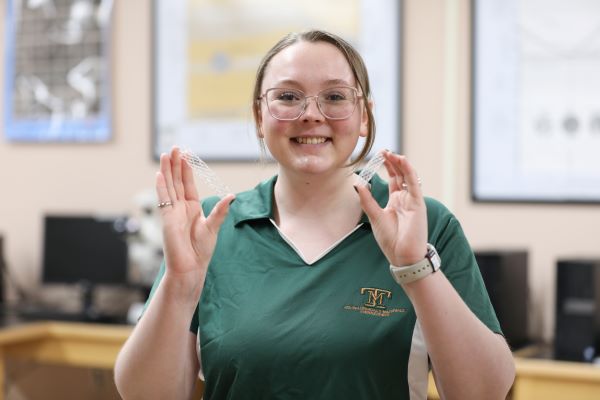Montana Tech alumna, faculty publish paper on improving coatings for vascular stents

A Montana Tech alumna and three faculty have published a new paper, “The preparation of PLGA coating on nitinol wire for vascular stent applications” in the Journal of Coatings Technology and Research. Baylie Phillips (B.S. Metallurgical and Materials Engineering, ’23, MS. Materials Science and Engineering, ’24) authored the article along with Dr. Sudhakar Vadiraja, Dr. Richard LaDouceur, and Dr. Blaine Berrington.
This research focuses on optimizing the dip deposition process for applying polymer coatings on nitinol wires, a critical material for vascular stents. By refining key deposition parameters—including solution concentration, dip speed, dwell time, and drainage time—the study achieved a uniform, defect-minimized coating with optimal thickness (10–20 microns). Coating defects in drug-eluting stents can lead to complications such as restenosis, thrombosis, coating failure, and mechanical failure, providing an incentive to improve the coating method.
“The findings provide a strong foundation for improving stent durability and biocompatibility, potentially enhancing patient outcomes in cardiovascular interventions by minimizing coating-related complications,” Phillips said. “Clinically, this research could lead to the development of more reliable stents with improved drug delivery and mechanical performance, reducing complications and improving long-term vascular health.”
As a master’s student, Phillips researched coatings that could be applied to vascular stents deployed in the human heart. Phillips learned that stents had a significant failure rate when she received one during her junior year. The stent crimped, and Phillips had to undergo a second procedure to replace it. She took a deep dive into the field, and her proposal to research stents is what won her a 2024 National Science Foundation (NSF) Graduate Research Fellowship. The National Science Foundation Graduate Research Fellowship is a five-year award with three years of financial support with an annual stipend of $37,000. The National Science Foundation makes the awards to ensure the quality, vitality, and diversity of the scientific and engineering workforce of the United States.
Phillips is continuing her stent research at the University of Washington, where she is pursuing a Ph.D. in Materials Science. In Spring 2025 Phillips finished building her own stent braiding and coating machine to further her research.